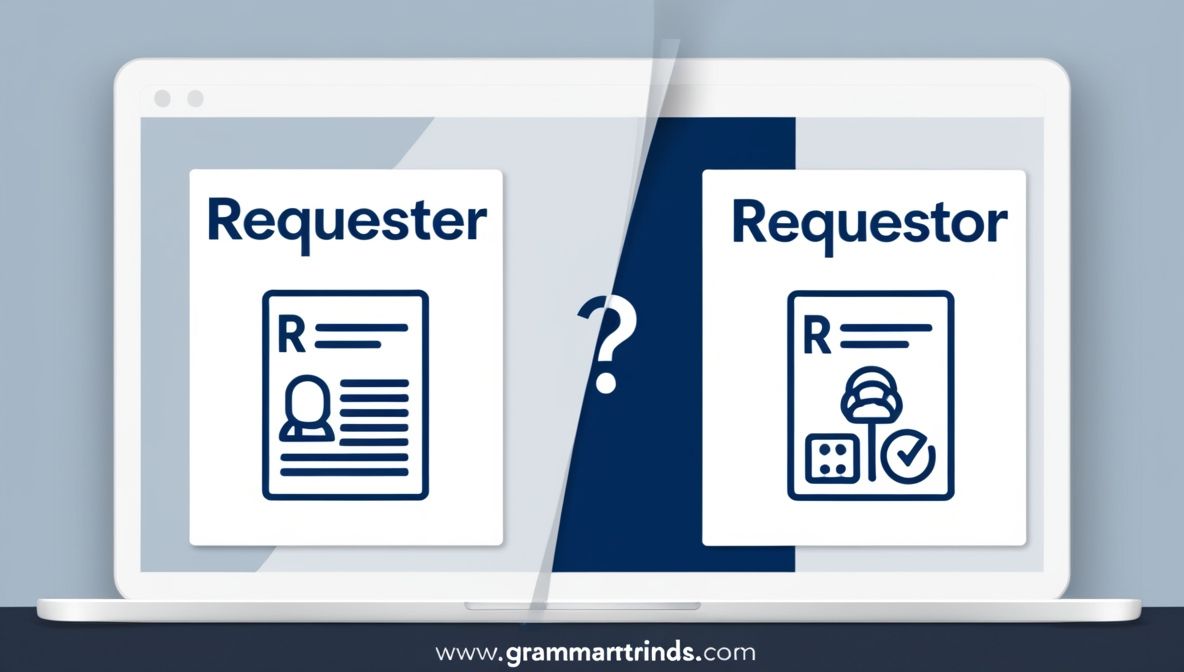Choosing between “Requester or Requestor” may seem like a small detail, but it matters more than you think especially in professional settings. Whether you’re writing legal content, handling technical documents, or preparing business reports, knowing when to use “Requester or Requestor” helps maintain clarity and precision.
In this article, we’ll explore the meaning, usage, and correct spelling of requester and requestor. You’ll learn which industries prefer which term and why it matters. By the end, you’ll clearly understand the difference between requester or requestor, with helpful tips to avoid mistakes and write with confidence.
What Do “Requester” and “Requestor” Mean?
Both words refer to someone who makes a request, but they appear in different settings.
The requester meaning and requestor meaning are nearly identical. They’re both agent nouns words formed by adding a suffix to a verb to indicate a person who performs that action. In this case, “request” becomes either “requester” or “requestor.” While interchangeable in casual conversation, the preferred term can shift depending on the domain legal, technical, or business terminology.
Requester vs Requestor: Spelling and Usage Explained
Here’s where it gets tricky: the words are often used in different fields, and “requester vs requestor spelling” isn’t always about correctness it’s about context.
| Domain | Preferred Term | Example Usage |
|---|---|---|
| General English | Requester | “The requester submitted a feedback form.” |
| Legal context | Requestor | “The requestor filed a motion with the court.” |
| Technical writing | Requester | “The requester initiated the API call.” |
| Government use | Requestor | “The FOIA requestor appealed the decision.” |
Tip: In most day-to-day and formal writing terms, use requester unless you’re working in legal or government settings.
Word Origins: How Did We Get Two Spellings?
Both words stem from the Latin root requaerere, meaning “to seek” or “to ask.” From there, English adopted the base “request” and eventually evolved it into two forms using agent noun suffixes: “-er” and “-or.”
- “-er” suffix is common in British and American English (e.g., teacher, runner, requester).
- “-or” suffix often appears in legal or classical terms (e.g., executor, requestor).
This explains why requestor shows up more in specialized terminology, while requester is the dominant form in everyday communication.
Choosing the Right Term Based on Context
Not sure which one to use? Here’s a guide:
Legal Writing or Contracts
Use requestor. It’s recognized in many legal contexts where formality and precedent matter.
Example: “The requestor is entitled to obtain these records under the statute.”
Technical or Software Documentation
Use requester. It’s widely used in API documentation and software engineering.
Example: “An access token must be generated before the requester can interact with the endpoint.”
Business Communication
Stick with requester, especially in formal letters, forms, and emails.
Example: “The requester’s signature is required to process the reimbursement.”
Examples in Real Scenarios
| Situation | Preferred Term | Example Sentence |
|---|---|---|
| Customer requesting service | Requester | “The requester asked for an upgrade to their plan.” |
| Legal filing | Requestor | “The requestor submitted an appeal to the zoning board.” |
| Developer interacting with API | Requester | “Each requester must authenticate before sending data.” |
| FOIA (Freedom of Information Act) | Requestor | “The FOIA requestor may appeal the redacted information.” |
Synonyms of Requester and Requestor
If you’re unsure about which spelling fits, use a synonym that’s neutral:
- Applicant
- Petitioner
- Claimant
- Seeker
- Inquirer
- User
Tip: These alternatives are especially useful in business writing where tone and clarity are essential.
Tips to Overcome the Confusion
- Check your industry’s standard. Legal, technical, and government fields may have established preferences.
- Use “requester” by default in general or professional writing guides.
- Refer to official templates or documentation from your organization.
- Use Grammarly or Microsoft Word’s style suggestions, but cross-check with real world examples.
- Search reputable sources (e.g., government websites, dictionaries) to verify.
Frequently Asked Questions (FAQs)
Is requester or requestor correct?
Both are correct, but requester is more commonly used in general writing and technical contexts.
What is the difference between requester and requestor?
There’s no significant difference in meaning, only in usage depending on the context or field.
Can requester and requestor be used interchangeably?
Yes, but it’s best to match your choice to the industry standard to avoid confusion or appear unprofessional.
Conclusion
So, which one is right requester or requestor? The answer depends on the situation. Use requester for most general, business, and technical writing. Use requestor in legal or government settings. Both mean the same: someone who makes a request. But the spelling choice can show attention to detail.
When in doubt, choose the more common form requester. It’s widely accepted and fits in most contexts. Always stay consistent in your writing.
